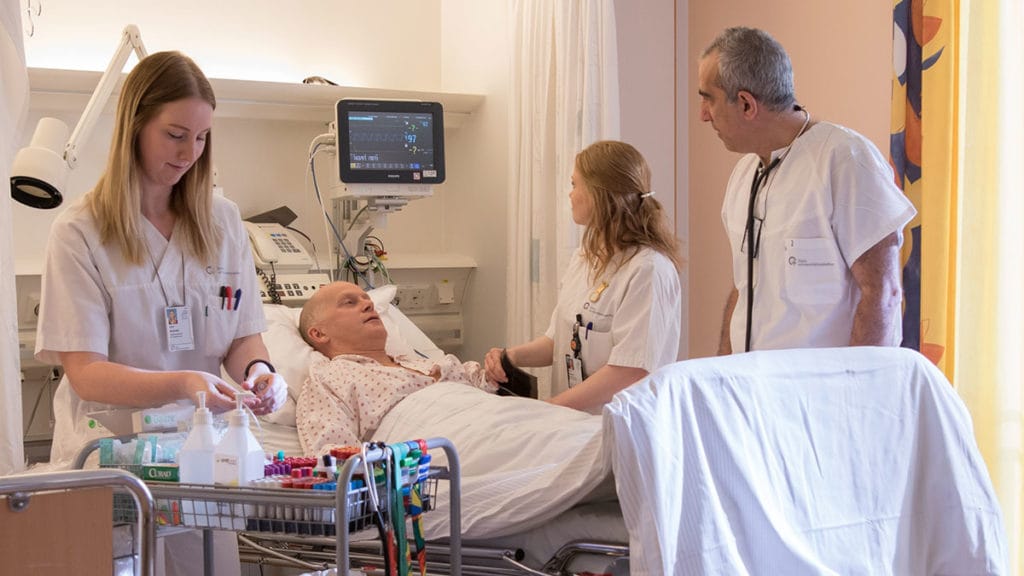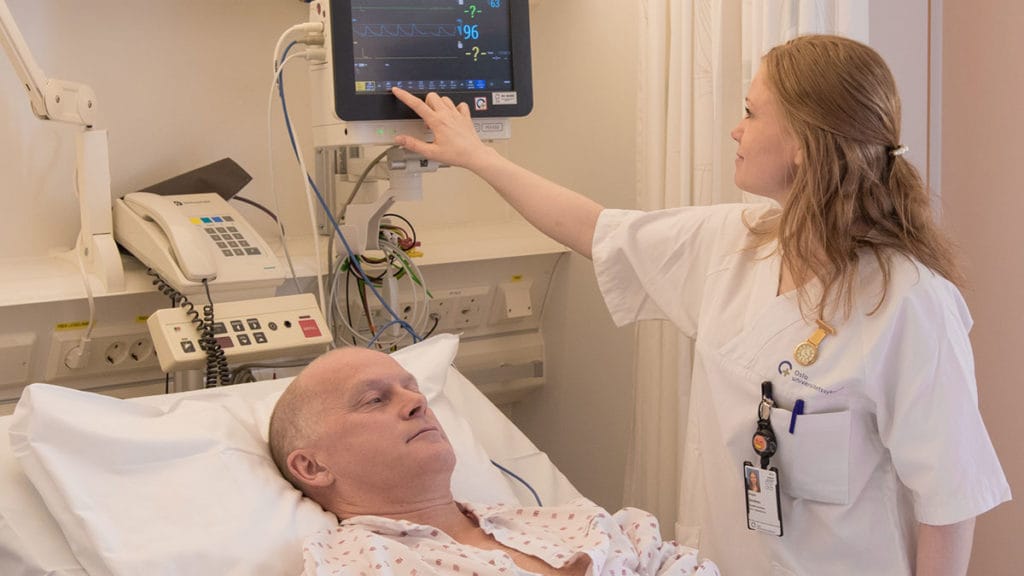Managing 20 clinical trials at the same time
The Clinical Trial Unit is located next to the cardiac monitoring unit and in the heart of Rikshospitalet University Hospital, both in a literal and in a figurative sense. ‘We are known for our high-quality deliveries in demanding early-phase trials’, says Kristin Sandnes, clinical trial coordinator.
By Elisabeth Kirkeng Andersen
Kristin Sandnes is one of six employees at the Clinical Trial Unit who work hard to ensure that both patients and healthy volunteers have a positive experience when participating in clinical trials.
– Some patients are in difficult life situations, and we get to know them well when they participate in our trials. It can be demanding when things don’t go according to plan, but it is also rewarding to have the opportunity to follow people in different life processes so closely. We offer the patients a unique follow up that very few patients are granted, says Sandnes.
Sandnes completed her nursing studies in 2008. For some years, she worked at various medical departments at Akershus University Hospital, before curiosity brought her back to school.
– I completed my master’s degree in health sciences in 2015, and started working at the Clinical Trial Unit. During the five years I’ve worked here, we have seen an increase in the number of clinical trials. Head of Section Hasse Khiabani Zaré has worked closely with Siri Kolle at Inven2 to make this happen, says Sandnes.
Siri Kolle is responsible for clinical trials at Inven2, and holds biannual follow-up meetings with the Clinical Trial Unit, in addition to continuous contact throughout the year.
– The Clinical Trial Unit is an important resource for the implementation of clinical trials at the hospital. Their competence, facilities and resources are excellent, which enables them to carry out complex early-phase trials for most diagnoses. They follow their trial participants up closely and create high-quality data. The companies praise them for the work they do and want to conduct their trials at the unit, says Kolle.
Attention to details are necessary
The Clinical Trial Unit’s seal of approval is its compliance with the ‘Good Clinical Practice’ standard. This is the golden standard for clinical studies: an international quality standard with guidelines for how clinical trials should be conducted.
– Early-phase trials are demanding. There are many procedures to follow. Blood sample collection and other forms of data collection must be carried out at set times in accordance with the trial protocol. Test results must be packaged in a specific way and sent to a central laboratory somewhere in Europe or the US within a certain amount of time, Sandnes explains, and adds:
– You almost need a hint of OCD to enjoy working on these trials, she laughs.
Sandnes and her colleagues prioritize and focus on inclusion of patients in accordance with agreements, quick start-up processes, and good data collection and reporting.
– The data must be of a high quality, and are registered as possible. Patient safety is extremely important in early-phase trials. Should serious side effects occur, it is important to report them immediately, says Sandnes.
Expert in early-phase trials
At present, 20 clinical trials are taking place at the Clinical Trial Unit, and the unit is in the process of appointing a new clinical trial nurse to cover the workload.
Once they have appointed a new nurse, the Clinical Trial Unit will consist of three clinical trial nurses, one trial coordinator, one biomedical laboratory scientist, one pharmacist and Khiabani Zaré, who is both a clinician and clinical pharmacologist.
– In addition, we hire clinical experts as needed. The fact that we can carry out all types of trials for the different medical departments at Rikshospitalet is what makes us unique. We specialize in demanding early-phase trials. Less demanding later-phase trials is normally conducted in the clinical department without our assistance, says Sandnes.
At the Clinical Trial Unit, they have the equipment and infrastructure they need. The unit’s location next to the cardiac monitoring unit is not coincidental.
– This is an important location for us. Acute situations can arise with patients who are given a pharmaceutical that has not been tested on a significant number of people before. Safety always comes first, says Sandnes.
Staying ahead of a trial and planning it well in advance is a significant reason why the unit can manage 20 demanding trials at the same time.
Sandnes points out that the work the unit conducts on a daily basis is important. The doctors who act as principal investigators in the trials, keep coming back to cooperate with them. The number of trials is increasing and the pharmaceutical companies are happy.

Photo: Laila Brun.
Good collaboration with Inven2
The employees at the unit have different roles. Sandnes is responsible for preparing trial budgets as new trials are assigned from industrial parties. She therefore collaborates closely with Inven2.
– I’m delighted about how the work is divided between us and Inven2. They take care of negotiating agreements and invoicing. That enables us to focus on what we do best, namely delivering good data and following up the trial and the patients who take part in it, says Sandnes.
She works closely with Tine Slettedal Jansson, who is clinical contract manager in Inven2.
– Tine manages many of our studies. We know each other well, and Tine knows how we operate and can give us advice and insight. We have a reputation for being consistent and organised, and are known for our quick deliveries, says Sandnes.
The Ministry of Health and Care Services is working on an action plan for clinical trials, and the government’s policy is that the number of clinical trials in Norway must increase. This has not gone unnoticed in the unit.
– This is an argument we use for all it’s worth vis-à-vis the management. We must work hard, show good results and keep growing, says Sandnes.
Success due to expertise and the working environment
There are many reasons for the success of Rikshospitalet’s Clinical Trial Unit. Its high professional standard and unique competence, as well as the good working environment and heart-warming atmosphere are some of them.
Other success criteria are the fact that they facilitate for doctors to actively participate in the trials and that they are able to keep the patients in the trials.
– We really get to know the patients, which makes it easier for us to motivate them to complete the trial. We very rarely see patients dropping out of the trials. This is very important for the pharmaceutical company that is responsible for the trial, says Sandnes.
There is a real heart-warming atmosphere at the unit. I noticed this myself in November 2019, when I wrote about Sander (8). He is part of a trial for a new type of treatment for the rare disease he has. Read more about it here: «Gir nytt håp til barn med sjelden sykdom» (“New hope for children with rare disease”).
The Clinical Trial Unit recently signed an agreement with the pharmaceutical company Celgene for a phase 1 clinical trial, the earliest phase of clinical trials. A brand new pharmaceutical, which has not been named or classified yet, is to be tested against the blood cancer acute myeloid leukaemia (AML).
– This trial will take place here, in Bergen and in the USA. It’s great that we can offer this to the patients who have been through all types of treatment without any effect. Securing an agreement for a clinical trial of this nature is a great achievement, says Sandnes.
And as some trials are initiated, the results of others begin to show. Soon a nasal spray with an antidote to treat heroin overdoses will be introduced on the market.
– This means a lot to people who are addicted to drugs or who work in, or closely with, an environment where heroin is widespread. Hopefully, many deaths due to overdose can be prevented when the antidote can be administered as a nasal spray. Knowing that we have contributed to this is a good feeling, says Sandnes.

Kristin Sandnes with patient. Photo: Laila Brun.
